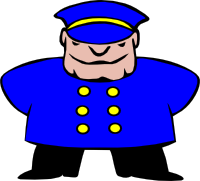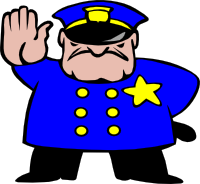Associations to the word «Police»
Noun
- Constable
- Enforcement
- Brutality
- Protester
- Misconduct
- Crime
- Swat
- Inspector
- Patrol
- Riot
- Suspect
- Commissioner
- Cid
- Terrorism
- Narcotic
- Officer
- Arrest
- Cop
- Peacekeeping
- Criminal
- Surveillance
- Firearm
- Investigation
- Offender
- Precinct
- Directorate
- Accountability
- Corruption
- Harassment
- Sheriff
- Military
- Trafficking
- Traffic
- Policeman
- Midlands
- Prostitution
- Department
- Security
- Prosecution
- Agency
- Provost
- Violence
- Recruitment
- Jurisdiction
- Smuggling
- Protest
- Force
- Incident
- Offence
- Vigilance
- Civilian
- Gang
- Demonstration
- Federal
- Theft
- Unrest
- Disposal
- Probation
- Somerset
- Police
- Reeve
- Demonstrator
- Provincial
Adjective
Pictures for the word «Police»
Wiktionary
POLICE, noun. A civil force granted the legal authority for law enforcement and maintaining public order. [from 18th c.]
POLICE, noun. (regional) (chiefly US) (Caribbean) (Scotland) A police officer. [from 19th c.]
POLICE, noun. (obsolete) Policy. [15th-19th c.]
POLICE, noun. (obsolete) Communal living; civilization. [16th-19th c.]
POLICE, noun. (now rare) (historical) The regulation of a given community or society; administration, law and order etc. [from 17th c.]
POLICE, verb. (transitive) To enforce the law and keep order among (a group).
POLICE, verb. (transitive) To patrol or clean up an area.
POLICE, verb. (transitive) (figurative) To enforce norms or standards upon.
POLICE BATON, noun. A night stick
POLICE BEAT, noun. Used other than as an idiom: see police, beat.
POLICE BEAT, noun. (Australia) (Queensland) A small police station, with a limited range of facilities, located in an officer's residence or in a shopping centre.
POLICE BEATS, noun. Plural of police beat
POLICE BLOTTER, noun. (US) A register, maintained by the desk sergeant, of people arrested or brought in for questioning to a police station.
POLICE BOX, noun. (chiefly British) (dated) a telephone kiosk where members of the public may telephone the police; a few original boxes still exist in Britain, but they do not operate. Currently, the city of Glasgow (Scotland) has new police boxes, which are not booths but computerised kiosks, that connect the caller to a police CCTV control room operator.
POLICE BOX, noun. A small community police station, a koban.
POLICE BOXES, noun. Plural of police box
POLICE BRUTALITY, noun. The use of excessive, unjustified force (typically of a physical nature, but also including verbal abuse and psychological intimidation) by a police officer while carrying out law enforcement duties.
POLICE CAR, noun. A vehicle used by a police officer when on duty.
POLICE CARS, noun. Plural of police car
POLICE CHIEF, noun. The head or leader of a police department or constabulary of a local government.
POLICE DEPARTMENT, noun. (law enforcement) Police force, especially a local or regional branch of a national police force.
POLICE DEPARTMENTS, noun. Plural of police department
POLICE DOG, noun. A canine trained and employed by the police to pursue suspects or sniff out contraband.
POLICE DOGS, noun. Plural of police dog
POLICE FORCE, noun. (law enforcement) Any police organization; a constabulary.
POLICE FORCES, noun. Plural of police force
POLICE LINE, noun. A line, often marked with yellow tape, demarcating a crime or accident scene and which bystanders are not supposed to cross.
POLICE LINE, noun. A line of police officers standing guard.
POLICE MAN, noun. Alternative spelling of policeman
POLICE MEN, noun. Plural of police man (alternative spelling of policemen).
POLICE OFFICER, noun. A peace officer and member of a police force, i.e. policeman or policewoman.
POLICE OFFICERS, noun. Plural of police officer
POLICE POWER, noun. (legal) The inherent power, incident to sovereignty, of a state to regulate and exercise reasonable control over matters of public health, public morals, public safety, and in general, all things relating to the general welfare.
POLICE POWERS, noun. Plural of police power
POLICE PROCEDURAL, noun. A sub-genre of crime fiction which portrays the activities of a police force as they investigate crimes. Unlike other types of crime fiction, the perpetrator may be known at the outset of the story.
POLICE PROTECTION, noun. Law enforcement agency tasked to safeguard a community or a person from crime.
POLICE SERVICE, noun. (law enforcement) Police force.
POLICE SERVICE OF NORTHERN IRELAND, proper noun. The police force that serves Northern Ireland.
POLICE SERVICES, noun. Plural of police service
POLICE STATE, noun. (usually pejorative) A polity whose government exercises strict and repressive control of the people, by means of police.
POLICE STATES, noun. Plural of police state
POLICE STATION, noun. A building serving as the headquarters of a branch of the police force.
POLICE STATIONS, noun. Plural of police station
POLICE TAPE, noun. Tape used as a police barricade, typically used to restrict access at the scene of a crime.
POLICE VILLAGE, noun. (Canada) (historical) Part of a township in Ontario, Canada, not incorporated by the provincial government, and having its own elected governing body of trustees.
POLICE VILLAGES, noun. Plural of police village
POLICE VIOLENCE, noun. Police brutality
Dictionary definition
POLICE, noun. The force of policemen and officers; "the law came looking for him".
POLICE, verb. Maintain the security of by carrying out a patrol.
Wise words
Much wisdom often goes with fewest words.



